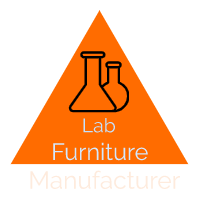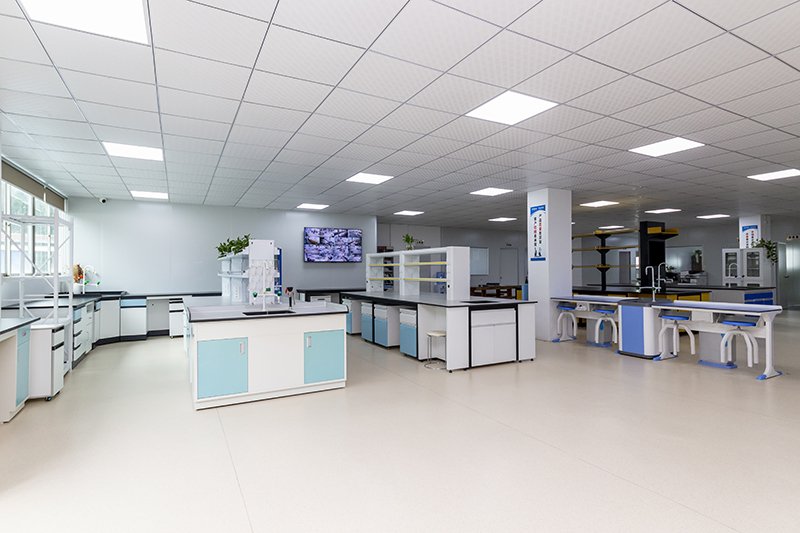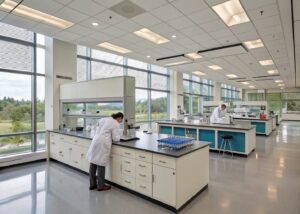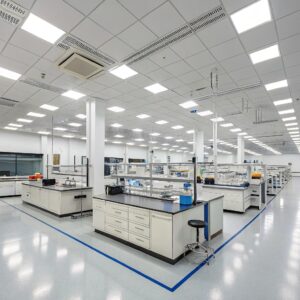Lab furniture is a critical component in the design and functionality of any laboratory, whether it’s a pharmaceutical, chemical, biotechnology, clinical, or educational lab.
Understanding the laboratory and lab furniture classification will help you choose the right furniture. Because it is not only ensures safety and compliance with regulations but also enhances productivity and workflow.
This comprehensive guide explores various types of lab furniture, their applications across different industries, and how they contribute to a well-organized and efficient laboratory environment.
Introduction to Lab Furniture
Lab furniture encompasses a wide range of products designed to meet the specific needs of laboratory environments.
These products include laboratory workbenches, chemical storage cabinets, fume hoods, biosafety cabinets, and much more. The selection of appropriate lab furniture is essential for maintaining a safe, efficient, and compliant lab space.
Types of Lab Furniture and Their Applications
Laboratory Workbenches
Laboratory Workbenches are the cornerstone of any lab, providing a stable and durable surface for conducting experiments and procedures.
They come in various materials, including chemical resistant countertops, to withstand harsh chemicals and provide a long-lasting work surface.
Adjustable height benches are also available to ensure ergonomic comfort for lab personnel.
Chemical Storage Cabinets
Chemical Storage Cabinets are designed to store hazardous materials safely.
These cabinets include acid storage cabinets, flammable material storage cabinets, and hazardous material cabinets, each specifically engineered to store different types of chemicals securely.
Fire-resistant cabinets are also essential for labs handling flammable substances.
Fume Hoods
Fume Hoods are crucial for labs dealing with volatile chemicals. These units protect lab personnel by ventilating hazardous fumes and vapors, ensuring a safe working environment. Chemical fume extractors and ventilated cabinets are variations designed to meet specific needs within the lab.
Biosafety Cabinets
Biosafety Cabinets are essential in biotechnology and clinical labs, providing a sterile work environment to prevent contamination. These cabinets are particularly important in labs dealing with infectious agents, ensuring both product and personnel protection.
Lab Stool and Chair
Lab Stools and Chairs are designed for comfort and ergonomics, allowing lab personnel to work efficiently for extended periods. Laboratory seating options include ergonomic chairs and stools tailored to meet the needs of various lab environments.
Lab Tables
Lab Tables come in various designs, including laboratory benchtop islands and instrument benches. These tables provide ample space for equipment and experiments, ensuring a well-organized lab.
Lab Sinks
Lab Sinks are available in materials like acid resistant sinks and are designed to handle the specific needs of lab environments. They are essential for washing glassware and disposing of chemical waste safely.
Mobile Lab Carts
Mobile Lab Carts provide flexibility in lab setups, allowing equipment and supplies to be moved easily. These carts are particularly useful in dynamic lab environments where workstations need to be reconfigured frequently.
Lab Shelving Units
Lab Shelving Units and modular shelving systems are critical for organizing lab supplies and equipment. Overhead storage cabinets and wall cabinets provide additional storage space without taking up valuable floor area.
Antivibration Tables
Antivibration Tables are essential for labs using sensitive equipment like microscopes and balances. These tables reduce vibrations, ensuring accurate measurements and observations.
ESD (Electrostatic Discharge) Workbenches
ESD Workbenches are designed for electronics and engineering labs to prevent damage to sensitive electronic components from static electricity.
Balance Tables
Balance Tables are specifically designed to provide a stable surface for precision balances and scales, minimizing vibrations and ensuring accurate measurements.
Microscope Tables
Microscope Tables are tailored to provide stability and comfort for extended use of microscopes, often featuring anti-vibration features to enhance accuracy.
Laminar Flow Hoods
Laminar Flow Hoods are used to create a contamination free environment for sensitive procedures, often utilized in biotechnology and pharmaceutical labs.
Autoclaves
Autoclaves are essential for sterilizing equipment and materials in biotechnology, clinical, and research labs. They ensure that all tools are free of contaminants before use.
Incubators
Incubators are used to grow and maintain microbial cultures under controlled conditions, vital for research and clinical applications.
Refrigerated Storage Units
Refrigerated Storage Units and lab freezers are critical for preserving biological samples, reagents, and other temperature-sensitive materials.
Specimen Collection Stations
Specimen Collection Stations are designed for clinical labs, providing a clean and organized area for collecting and processing samples.
Technical Workstations
Technical Workstations offer integrated utilities like gas, water, and electrical outlets, making them versatile and efficient for various lab tasks.
Sterile Workstations
Sterile Workstations are essential in environments requiring high levels of cleanliness, such as pharmaceutical and biotechnology labs.
Demonstration Tables
Demonstration Tables are often used in educational labs, providing a central area for instructors to demonstrate experiments and procedures.
Prep Tables
Prep Tables with integrated sinks and ample work surface are crucial for food and beverage labs, facilitating sample preparation and testing.
Tool Storage Cabinets
Tool Storage Cabinets and pegboards for tools help keep the lab organized, ensuring that tools are readily accessible when needed.
Cleanroom Furniture
Cleanroom Furniture is designed for environments requiring strict cleanliness standards, such as semiconductor manufacturing and certain biotechnology applications. Generally, it is related to stainless steel furniture.
Field Station Carts
Field Station Carts provide portable workstations for environmental and agricultural labs, allowing researchers to conduct tests in the field.
Trace Evidence Workstations
Trace Evidence Workstations are specialized for forensics labs, designed to handle small evidence samples meticulously.
Centrifuge Tables
Centrifuge Tables are sturdy and vibration resistant, supporting centrifuge operations and ensuring safe and efficient sample processing.
Reagent Shelves and Racks
Reagent Shelves and Reagent Racks provide organized storage for chemicals and reagents, ensuring easy access and safe storage.
Safety Stations
Safety Stations, including eyewash stations and emergency showers, are critical for addressing accidents and ensuring personnel safety in labs handling hazardous materials.
Ventilated Cabinets
Ventilated Cabinets are used for storing volatile substances safely, ensuring proper ventilation and reducing the risk of hazardous fumes accumulating.
Drying Racks
Drying Racks are used for drying lab glassware and equipment, often designed to maximize airflow and minimize contamination.
Laboratory Desks
Laboratory Desks provide workspaces for administrative tasks, data analysis, and report writing within the lab environment.
Laboratory Fittings
Laboratory Fittings, such as taps and gas outlets, are integrated into lab benches and workstations, providing essential utilities for lab operations.
Hazardous Material Cabinets
Hazardous Material Cabinets are designed for storing dangerous chemicals safely, with features like ventilation and fire resistance to enhance safety.
Different Types Of Laboratory And The Lab Furniture Application
Pharmaceutical Laboratory
Pharmaceutical labs require furniture that meets stringent standards for cleanliness, chemical resistance, and durability. Key items include:
Pharmaceutical Lab Furniture: Specialized workbenches and storage units designed to handle pharmaceutical compounds.
Sterile Workstations: To maintain a contamination free environment.
Refrigerated Storage Units: For preserving sensitive materials.
Chemical Storage Cabinets: For storing reagents and hazardous chemicals.
Chemical Laboratory
Chemical labs handle a variety of hazardous substances, necessitating robust and resistant furniture. Essential items include:
Chemical Lab Furniture: Workbenches with chemical resistant countertops.
Fume Hoods: To ventilate hazardous fumes.
Acid Storage Cabinets: For storing corrosive substances.
Safety Stations: Including eyewash stations and emergency showers.
Biotechnology Laboratory
Biotechnology labs focus on biological research and require furniture that supports sterile and controlled environments. Key items include:
Biotechnology Lab Furniture: Workbenches and cabinets tailored for biological research.
Biosafety Cabinets: To protect against biological hazards.
Laminar Flow Hoods: For contamination free workspaces.
Autoclaves: For sterilizing equipment and materials.
Clinical and Medical Laboratory
Clinical and medical labs require furniture that supports diagnostic and therapeutic activities. Essential items include:
Clinical Lab Furniture: Workstations and storage units designed for medical research.
Specimen Collection Stations: For collecting and processing patient samples.
Centrifuge Tables: For sample processing.
Sterile Workstations: To maintain clean environments for sensitive procedures.
Educational and Research Laboratory
Educational and research labs need versatile and durable furniture to support a variety of experiments and learning activities. Key items include:
Educational Lab Furniture: Workbenches and desks designed for teaching and research.
Demonstration Tables: For instructors to showcase experiments.
Adjustable Height Benches: To accommodate different user needs.
Lab Stools and Chairs: Ergonomic seating for students and researchers.
Electronics and Engineering Laboratory
Electronics and engineering labs handle sensitive components and require furniture that prevents static damage and supports precision work. Essential items include:
Electronics Lab Furniture: ESD workbenches and technical workstations.
Antivibration Tables: For sensitive equipment.
Tool Storage Cabinets: For organizing tools and components.
Laboratory Desks: For data analysis and report writing.
Food and Beverage Industry Laboratory
Food and beverage labs require furniture that supports sample preparation, testing, and hygiene standards. Key items include:
Food Industry Lab Furniture: Stainless steel workbenches and prep tables.
Refrigerated Storage Units: For preserving samples.
Cleanroom Furniture: For environments requiring high hygiene standards.
Lab Sinks: For washing and disposing of materials safely.
Environmental and Agricultural Laboratory
Environmental and agricultural labs need furniture that supports field research and sample testing. Essential items include:
Environmental Lab Furniture: Workbenches and storage units for environmental testing.
Field Station Carts: Portable workstations for outdoor research.
Storage Cabinets for Samples: Including temperature-controlled units.
Lab Sinks: For washing soil and water samples.
Forensics and Crime Laboratory
Forensics and crime labs handle evidence and require specialized furniture to support detailed analysis and secure storage. Key items include:
Forensics Lab Furniture: Workstations and cabinets for evidence processing.
Trace Evidence Workstations: For handling small evidence samples.
Microscope Tables: For detailed examination.
Secure Storage Cabinets: For storing sensitive materials.
No matter whether you are a lab designer, lab building contractor or a lab furniture industry professional, your first and basic knowledge should understand different types of lab furniture and the application to different laboratory.By understanding that, you can enhance productivity, ensure safety, and maintain compliance with regulatory standards




